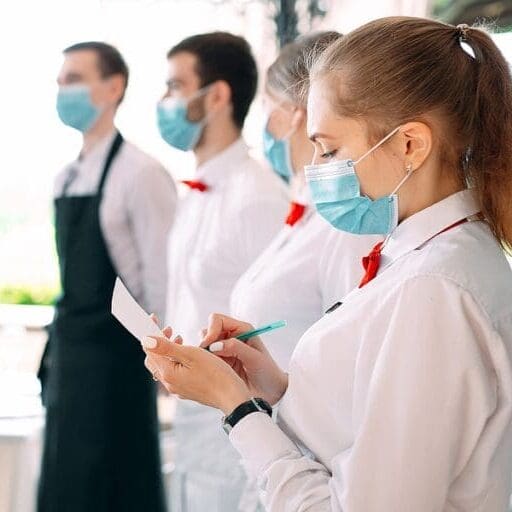 The COVID-19 pandemic turned the world upside down almost overnight. With millions of businesses forced to close down or work remotely, people staying home, and widespread financial uncertainty, the hotel industry has struggled over the last year.
The COVID-19 pandemic turned the world upside down almost overnight. With millions of businesses forced to close down or work remotely, people staying home, and widespread financial uncertainty, the hotel industry has struggled over the last year.
However, there have been a few key industries such as ecommerce retailers, tech companies, and manufacturing that have survived and even expanded during COVID.
We take a look at four important lessons hoteliers can take from these key industries that survived the pandemic.
Flexibility in working methods
COVID lockdowns and quarantine measures forced offices and businesses worldwide to close up and send workers home. While many industries were hugely unprepared for working remotely, those in tech and ecommerce found that they successfully adapted their working methods.
Using a range of online tools and software to improve communication and collaboration, these industries have found ways to optimize their workflows and be just as productive when working remotely as they would be in the office.
Successful businesses during COVID have used project management tools like Asana to coordinate their remote team’s work, ensure everyone knows exactly what they need to be working on, and guarantee deadlines are never missed. Read this Asana review to understand why Asana is a popular choice for remote teams.
Cloud storage is also essential to easily share documents, and using an instant messenger system like Slack helps everyone stay on the same page and avoid any costly miscommunication errors. It’s important to understand how to make the most of Slack and other tools to ensure that they actually improve productivity and efficiency, and don’t create more admin and distractions.
To survive the pandemic and beyond it’s important that hotels and accommodation businesses can create a flexible way of working. They need to ensure that their teams can be effective and productive wherever they are even if they can’t all be based within the hotel due to safety measures.
Online presence is essential
While physical premises have been shut down for many businesses, those that have a good online presence are flourishing.
Businesses that are still digging their heels in about setting up a website or keeping it regularly updated will have suffered during the pandemic. In particular retail stores and hospitality businesses need to learn how to adapt and connect with customers online.
It’s really simple to set up a good website that allows you to sell products online or even takeaway food and drink orders. Even small businesses are surviving COVID because they’re using an ecommerce platform such as Lemonstand to create a store where they can sell products online. Or bars, restaurants, and hotels could sell takeaway food, drinks or meal kits. If you read this LemonStand review you’ll learn how LemonStand is one of the simplest, most affordable ways to get your online business up and running.
The pandemic has really highlighted just how important an online presence is, so it’s essential to learn lessons from ecommerce and technology companies that haven’t just survived, but actually grown during COVID. Hotel businesses should be focused on updating their websites, staying connected with customers and letting them know what services and products they can provide during the pandemic.
Adaptability of the business
It’s not just how the business’s team is working that needs to be flexible, the businesses that have survived during the pandemic have been able to quickly react and adapt their plans.
Many in the manufacturing, tech, and ecommerce industries quickly refocused their whole business towards producing, creating, or selling essential equipment that was in high demand and short supply. This included things like Personal Protective Equipment, hand sanitizer, or helping to develop track and trace technology.
Not all of these adaptations were necessarily for profit, but even when they were pitching in and donating their services it’s still going to boost the brand’s visibility and reputation. Tech companies especially have also adapted to focusing on ways to aid with remote working, cloud computing, security, and even tools for rapidly growing ecommerce businesses.
While tourism and travel has been put on hold, many hotels are finding ways to use their space for businesses and remote working set ups, or even to provide accomodation to key workers who are isolating from their families. Rooms could be turned into individual offices, they can provide socially distanced meeting spaces. Hotel restaurants can provide take out or prepared meals to cook at home.
The key lesson to learn from other industries is that you need to be able to adapt quickly — changes are happening overnight and there’s no time for long deliberations and discussions. Those that reacted to these big shifts in consumer demand and priorities are going to come out on top.
Planning for the worst
Another key thing to learn from industries that are surviving the pandemic is the importance of an effective contingency plan. They have shown the best way to plan for the worst — how to optimize your business operations, ways in which you can future proof your business, and what data and insights you need to be following to adapt quickly enough.
Businesses need to understand how other industries have utilized their existing staff and focused on upskilling teams so that they can take on multiple roles when it’s not practical to hire more staff. For example, if you’d usually outsource certain tasks such as cleaning, maintenance, or even marketing, then train your inhouse team to complete them. It will keep staff engaged and cut your outgoings in the long run.
The industries that have survived the pandemic understand when and how to take risks, and how essential it is to have enough funding behind them to fall back on when things get difficult.
Overall, the key things for hoteliers and hospitality businesses to learn from industries that have survived the pandemic is the importance of flexibility and ensuring that you’re able to adapt to rapidly changing circumstances.


















